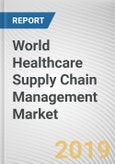There are several factors influencing the growth of healthcare supply chain management market. Companies determined to curb the rising healthcare costs have played a vital role in driving the market growth. Besides this, the demand for quality inventory management system has helped the market to grow considerably. Other factors such as better patient care as well as compliance with government regulations have also boosted the market growth. However, the factors such as high cost associated with the sophisticated software and time taken to implement the software have restricted the market growth to a greater extent. These restraints often result in unjustifiable payback period for SMEs.
The healthcare supply chain management market is segmented based on delivery model, software, hardware, end-customer and geography. Based on the delivery model, the market segments covered in the report are cloud-based, web-based and on premise. In addition, healthcare supply chain management software includes supplier management software, procurement software, transportation management and others. The hardware segment consists of barcode, RFID, systems and others. End-customers served by the market consists of healthcare providers, suppliers, distributors and others. The market for healthcare supply chain management is segmented based on geography into North America, Europe, Latin America, Middle East and Africa (LAMEA) and Asia Pacific.
The companies active in the healthcare supply chain management market are adopting effective business strategies to stay competitive. Major brands are seen investing generously in research and development. Key market players are also seen eyeing the local brands for acquisition. Other business model such as joint venture and market entry strategies are helping prominent vendors to make their presence felt in the market and increase their product portfolio. Some of the key players operating in this market place include SAP AG Group, Oracle Corporation, McKesson Corporation, Providence Health & Services, Geisinger Health System, AmerisourceBergen, Intermountain Healthcare, Advocate Health Care and others.
HEALTHCARE SUPPLY CHAIN MANAGEMENT MARKET KEY BENEFITS
The market research study provides an extensive assessment of different market entry strategies and brand positioning tactics adopted by key market players to stay competitive
Research techniques such as primary and secondary research methods have been used intelligently to outline the key market drivers, restraints and opportunities shaping the market worldwide
The study further discusses about the policy amendments that are likely to determine the growth rate and market share
Comprehensive study of recent launches, collaborations, acquisitions and mergers etc. highlights how enterprises are determined to stay competitive
SWOT analysis of the market brings to the table the weaknesses, strengths, opportunities and threats
HEALTHCARE SUPPLY CHAIN MANAGEMENT MARKET KEY SEGMENTS
Market By Software
Supplier Management Software
Transportation Software
Procurement Software
Others
Market By Hardware
System
Barcode
RFID
Others
Market By Delivery Model
On premise
Cloud based
Web based
Market By EndUsers
Healthcare Providers
Suppliers
Distributors
Others
Market By Geography
North America
Europe
Asia-Pacific
LAMEA
KEY PLAYERS
SAP AG Group
Oracle Corporation
McKesson Corporation
Providence Health & Services
Geisinger Health System
AmerisourceBergen
Intermountain Healthcare
Advocate Health Care
Methodology
The analyst offers exhaustive research and analysis based on a wide variety of factual inputs, which largely include interviews with industry participants, reliable statistics, and regional intelligence. The in-house industry experts play an instrumental role in designing analytic tools and models, tailored to the requirements of a particular industry segment. The primary research efforts include reaching out participants through mail, tele-conversations, referrals, professional networks, and face-to-face interactions.
They are also in professional corporate relations with various companies that allow them greater flexibility for reaching out to industry participants and commentators for interviews and discussions.
They also refer to a broad array of industry sources for their secondary research, which typically include; however, not limited to:
- Company SEC filings, annual reports, company websites, broker & financial reports, and investor presentations for competitive scenario and shape of the industry
- Scientific and technical writings for product information and related preemptions
- Regional government and statistical databases for macro analysis
- Authentic news articles and other related releases for market evaluation
- Internal and external proprietary databases, key market indicators, and relevant press releases for market estimates and forecast
Furthermore, the accuracy of the data will be analyzed and validated by conducting additional primaries with various industry experts and KOLs. They also provide robust post-sales support to clients.

LOADING...








